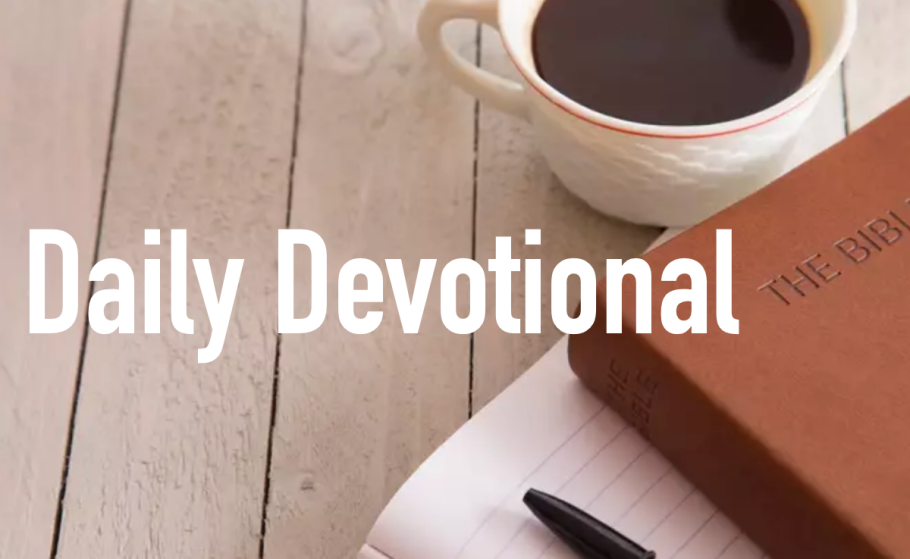
One of the earliest video games was Pac-Man. To play, you would use a controller to navigate a yellow, pie- shaped character through a maze while eating dots and fruit. The goal, of course, was for Pac-Man, and later Ms. Pac-Man, to avoid being eaten by the ghosts. Don’t slow down or you will be eaten and lose the game!
In Ecclesiastes 6:7–12, the Teacher calls us to slow down. He transitions into a long section of proverbs, or short sayings, that continue into chapters 8, 10, and 11, before closing out with the famous poem on death and dying and his final word on what it means to be a human: living in right relationship with our Maker.
These proverbs can feel like puz- zles, and their meaning is not always obvious upon first reading. That’s by design! So, let’s answer the Teacher’s call to think deeply and meditate on Scripture. In our fast-paced world, it can seem countercultural to slow down our rapid-achievement pace and absorb these truths.
Let’s consider today’s verse: “Everyone’s toil is for their mouth, yet their appetite is never satisfied” (v. 7). What does the Teacher mean? The obvious answer is that humans can be a lot like Pac-Man. We work so we can eat, and then we get hungry again. But let’s consider this proverb a bit more. He uses the negative word “toil” when he could have used the more neutral word “work.” What’s more, “appetite” in Hebrew is nephesh, which also means something like one’s “being” or “life.” Why use that term? What does he mean by “satisfied”? And what else does the Teacher say isn’t satisfied in his book? Is he saying that we can bea bit like Pac-Man, moving endlessly through a maze?
Go Deeper
Will you accept the Teacher’s invitation? If so, what are some practical steps you can take to make slowing down and meditating on God’s Word a more regular part of your life?
Pray with Us: Thank You, for Your life-giving Word! Guide us, Jesus, in the study of Scripture, deepen our understanding of its truths. “Your word is a lamp for my feet, a light on my path” (Ps. 119:105).

Have you ever been pulled over for speeding and prayed, “Lord! I’ll never speed again if you just don’t let the officer give me a speeding ticket!”? We don’t think of that sort of prayer as a vow, but that’s exactly what it is.
While the Bible doesn’t prohibit vows, it does make clear that they are fraught with danger, “do not be hasty in your heart to utter anything before God” (Eccl. 5:2). Numbers 30 outlines the regulations for making vows, the key issue being that when one makes a vow to the Lord, “he must not break his word but must do everything he said” (Num. 30:2). God does not require anyone to make a vow to Him, but He doesexpect the fulfillment of vows made. “It is better not to make a vow than to make one and not fulfill it” (v. 5). The Mosaic law treated rash or foolish vows to be a sin and made provisions for them (Lev. 5:4–5; see also Num. 30:6–8). God takes our words seriously.
In Ecclesiastes, the Teacher offers wise advice: “Let your words be few.” When we speak to God and to others, we should recognize God’s holiness: “God is in heaven and you are on earth so let your words be few” (v. 2). In the Lord’s Prayer, Jesus taught His disciples (and us) to use simple words that recognize who God is, ask Him for our needs, and trust Him to supply them (Matt. 6:9–13). Rather than piling up words to impress our friends or convince God to help us, Jesus said, we should approach God humbly and in faith (Matt. 6:6). God hears our words. Even so, He already knows what we need, so we should not make empty promises in a prideful attempt to bargain with the Creator of the universe.
Go Deeper
Have you ever made a vow to God? Why do you think God takes our words so seriously?
Pray with Us: Father, thank You for the valuable life lessons You are teaching us in the book of Ecclesiastes. One of the most difficult—how to use our words wisely and to be people of few words. Help us, Lord, to glorify you with everything we say.

In May 2023 the U.S. Surgeon General released a report detailing the effects of loneliness on the American population, claiming that “lacking social connection can increase the risk for premature death as much as smoking up to 15 cigarettes a day.” In addition, loneliness resulted in a “29% increased risk of heart disease and a 32% increased risk of stroke.” Isn’t it strange that in a world more connected than ever through technology, the scourge of loneliness still strikes a lethal blow?
The Teacher tackles social isolation in today’s passage. In verses 7–8 he states that he has observed a pattern in the world that seemed futile to him. This man was completely alone, “with neither son nor brother,” and yet he worked tirelessly. Surely this should not be, for God created humans in the Garden of Eden to be in relationship with others. In fact, the only not good thing God observed in His six days of Creation was isolation: “It is not good,” the Lord said, “for the man to be alone” (Gen. 2:18).
God’s solution to this “not good” aspect of creation is to “make a helper suitable for him” (Gen. 2:18). The Teacher’s solution is the same (minus the creation part!). In 4:9–12 he details the benefits of companionship: a higher return on your work, help when you fall, warmth during cold nights, and protection from attackers. Perhaps the Teacher didn’t have in mind the dangers of stroke and heart disease, but he knew that humans need one another because that is exactly how God designed us. And developing meaningful relationships with others is one way the church can present a compelling witness to the world around us. We are called to be in community with our fellow believers. “By this everyone will know that you are my disciples, if you love one another” (John 13:35).
Go Deeper
Have you experienced connection in your local church family? How can you nurture a relationship with another believer today?
Pray with Us: Jesus, thank You for the gift of fellowship. We are not alone—You saved us into a family of believers. In Your steadfast love and gentleness, teach us how to love one another as You have loved us.

Death, they say, is the great equalizer. The author of Ecclesiastes would agree. Once again, the Teacher calls us back to the book of Genesis. He has already shined a spotlight on the Garden of Eden, before sin entered the world. He presented the Garden of Eden as the model for how we receive God’s gifts of eating, drinking, working, and marriage. Now he reminds us of God’s curse of death in Genesis 3:19: “[F]or dust you are and to dust you will return.”
Today’s passage is difficult to read. The Teacher laments that humans and animals will suffer the same fate: death. You may be surprised at his question in verse 21: “Who knows if the human spirit rises upward and if the spirit of the animal goes down into the earth?” At first glance he seems without hope. What about the hope we have in the resurrection and our life with God in the new heavens and the new earth? Like any good teacher, he leaves us with this question for quite a long time. But in 12:7 he again alludes to Genesis 3:19 and answers the question, perhaps afraid we would miss his meaning: “The dust returns to the ground it came from, and the spirit returns to God who gave it.”
All of us are going to die; we are all like Abel: “Surely the fate of human beings is like that of the animals; the same fate awaits them both: As one dies, so dies the other. All have the same breath; humans have no advantage over animals. Everything is meaningless” (v. 19). But for those in Christ, those who have believed in the death and resurrection of God’s only Son, there is hope! Will you trust Him today?
Go Deeper
If you are in Christ, how can you share the hope of the resurrection with those you love? If you do not know Christ, believe in Him today!
Pray with Us: So often we can relate to the hopelessness and weariness of Ecclesiastes. But in our own despair and discouragement, we remember You, Lord, and Your Word, that “those who hope in the LORD will renew their strength” (Isa. 40:31).

When the film The Lion King was released in 1994, children all over the world sang along with Timon and Pumbaa (a meerkat and a warthog) and their “problem-free philosophy.” The pair taught us that “Hakuna Matata” meant “no worries.” It was their way of encouraging young Simba, who has just lost his father. The Lion King is not a Christian film, but the Teacher would agree at least in part with their basic philosophy.
We should enjoy the life God has given us! In Ecclesiastes 3, the Teacher laments (again) that there is no gain, or ultimate reward, from “toil,” or work (v. 9). Why? Because work doesn’t ultimately produce anything that lasts—all that it accomplishes is “meaningless” or gone too soon. But we should not descend into pessimistic nihilism or withdraw from work. Rather, we are to “be happy and to do good while [we] live,” and further to “eat and drink, and find satisfaction in all [our] toil” (v. 13). These things are “the gift of God.”
So, Hakuna Matata! Yes, but even more, the Teacher is telling us to realign our priorities and expectations. These daily activities God has given us (working, eating, and drinking) are gifts for our enjoyment. They were never meant to give us what only God can give us purpose, meaning, fulfillment, security, and hope. Rather, they are ephemeral experiences, temporal gifts from our good Father. God actually does want us to be happy—and that requires us to return, in a sense, to the Garden of Eden, where Adam and Eve enjoyed intimacy with God and an appropriate relationship with the gifts He gives: working, eating, and drinking.
Go Deeper
How do you view working, eating, and drinking? Are they idols you ask to fulfill you or take away your sorrows? Or do you see these activities as gifts from God to be enjoyed in the moment?
Pray with Us: Almighty God, You alone can bring peace into this world full of turmoil! Grant us grace to have our hearts fixed on You—where true joy and enjoyment of life can be found. We rest in Your faithfulness!

